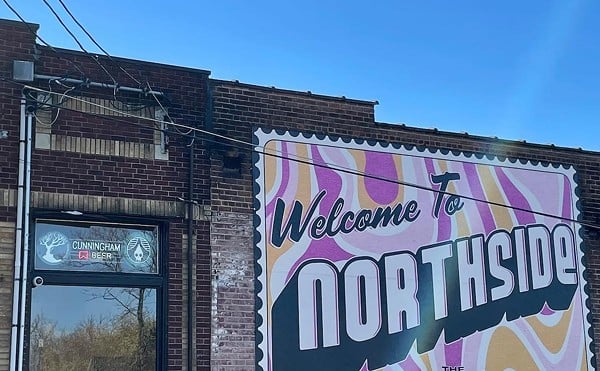|
Never mind that he's smiling while gray clouds pass overhead. The first thing that strikes from K-Drama's Web site is a vicious beat that detracts attention from those clouds over Cincinnati's skyline. In it, jittery synths wiggle around him shouting "Whew!" like he scoped a hot chick, crashed a new whip or hit the Lotto. But when he says, "One thing I'm aware of/In Christ Jesus, I'm taken care of/I don't worry 'bout a thang," it becomes evident that the song isn't talking about girls, cars or money.
The 22-year-old EMI Gospel recording artist is part of a movement called Holy Hip Hop, whose roots began in 1985 with Stephen Wiley's tape, Bible Break. Leaving a heavier impact was rapper D-Boy, who was murdered in Texas in 1991 for allegedly converting gang members into followers of Christ, as he inspired a flock of Christian rappers to continue spreading the faith. Artists with names like Gospel Gangstaz didn't make old folks at church say "Amen," but a younger generation felt them. And their messages came from a style they already understood.
By the late 1990s, Holy Hip Hop manifested when young people decided the church's message was dying for a rebirth. Chants like "Glory, glory!" stood in for "Baby, baby!" and themes of everlasting salvation replaced references to the fast life.
The catch-all was that it was done over bass-enriched tracks stylistically similar to those on Master P's No Limit Records.
Increasingly, after the Civil Rights Movement, which sparked from black churches, elders often ignored changes in the way youth communicated, and with many young adults straying from their congregations, the mission of Holy Hip Hop was to win them back by translating the message of Christ into language they recognized. Graffiti artists tag walls with messages of faith, but with permission, and some rappers twirl T-shirts, buck and stomp and get the crowd jumpy. Because of this, skeptics see it as an abominable likeness of secular Rap lifestyle.
"There's a guy named G. Craige Lewis who's against the Holy Hip Hop movement," K-Drama says. "He feels there's nothing wrong with Christian Rap but that Hip Hop is evil. He believes it's like a religion or a cult."
According to Elder Lewis' Web site, Exministries.com, he says, "There can be no Holy Hip Hoppers or no Christian Hip Hop because the culture cannot lend itself to the direction of the Holy Spirit," compares KRS-One and Afrika Bambaataa to cult leaders who teach people to worship themselves as gods. K-Drama basically disagrees, but is sensitive to why there's dissension.
"The churches are just now getting hip," he explains. "They thought Rap was of the devil because of what they heard in the media. The streets wasn't feelin' us because we was too church. But then the church wasn't feelin' us because we was too street. A lot of people quit. I was like, 'I'm gon' stick with this 'cause God didn't just give me this talent to do nothin' with it.' "
Before he became a rapper, Regis Jones attended Sunday services as time-passers. He heard the sermons that preached getting saved, but, as a kid on the verge of being kicked out of Walnut Hills High School, girls were in his immediate reach. He could try salvation later.
Laughing, he says, "I always said I'd do it when I get settled down, when I get 40 or 45."
But his first adult assessment came at 14 while attending a funeral. Heart failure ended the life of his 13-year-old friend, and as Regis viewed the body, he questioned; "If I were to die tomorrow, where would I spend eternity?"
"That question really hit home," says K-Drama. "I was like, 'You know what, God? I surrender my life to you. I'm no longer gonna run away from the call that you have on my life.' "
Before he would rap his testimony, he was tested. Zealous in spirit, he thought he could minister, misinterpreting Scriptures to his friends with the intent of spreading the Gospel. His mom encouraged him to develop a relationship with God instead of vainly spouting Scriptures. His dad, a former drug addict, battled with crack and the family frequently had to find new places to live.
"I always feared not being accepted, so I would do things for attention, and this is why I got kicked out of Walnut Hills," he says.
Along with his mother, personal mentors from his church and fellow Christian rapper Lazarus helped K-Drama shake his fear of being unaccepted.
"I used to say, 'nigga' in my songs. I guess trying to win these streets. Lazarus was like, 'That's what's gon' win the streets?' I realized in my walk that Hip Hop, the one thing the whole culture thrives on is truth. If I just be real, they'll be more open to hearing me."
EMI Gospel noticed K-Drama touring the country at festivals and distributing his CDs on Gospel Web sites, signing him last August, a day before his birthday.
Last week, he turned 22 but was more excited that his new CD, Behind the Glory shipped the next day. The radio/club-friendly set (due in stores this Tuesday) features production from Dove Award-winning producer Todd Collins and captures the buoyancy of third generation Hip Hop without straying from its message: live for God, not the world.
"We can still have hot beats," K-Drama says. "We can still have confidence in ourselves and rap for God."
K-DRAMA (k-dramamusic.com) performs Sept. 22 at The Underground with GRITS.





